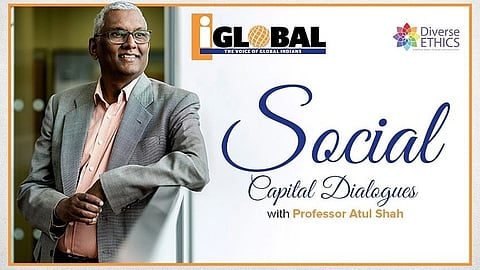

Many people see this is a contradiction. In Christianity it is believed that it is easier for a camel to go through the eye of a needle than for a rich man to go to heaven. Wealth accumulation has long been seen as evil.
In Islam, charity is encouraged as in most religions and interest is seen as haram and banned. All faiths have in their own ways reflected deeply about money, happiness and wealth. This week I was asked to speak on BBC Radio 4 about the Jain perspective on this topic.
In the Dharmic traditions, wealth has not been seen as evil – instead the focus is on the means of achieving it, and the understanding of the nature and limits of money. Possessiveness is actively discouraged. Money should be allowed to flow, and business should be a means of providing goods and services that are needed by a society at a fair price. Income and Profits are not the primary motive for enterprise, but a score for its efforts and something that should be shared with all the stakeholders of the business.
It is true that there are greedy businessmen, and some who accumulate without shame and even exploit their customers and suppliers through their power and financial capital.
Not everyone is Dharmic or contented. This is where communities and societies also often have checks and balances. For example, for charitable projects, the rich are expected to provide a larger share. Honour and reputation come from seva, charity or service and not from status and accumulation. Similarly, if they run large factories, businesses are expected to care for their workers and pay fair wages.
MORE LIKE THIS…
At universities, it is common for academics to be left-wing and radical. The rich are treated as elites and hated because of it. However, the record of Marxism and Communism has been poor for the environment as well as for equality and enterprise. No system is perfect. Dharmic Capitalism encourages enterprise, and some will become very rich in the process and inequality can increase as a result. What all universities ought to teach is an understanding of money and its role in personal family life, and the building of communities and society. Instead, neo-liberal economics encourages greed and accumulation and promotes inequality as an engine for economic prosperity. Caring and compassion are very far from these equations.
Faith and fortune can co-exist – it’s the purpose, culture and philanthropy that matters most. Honour and shame can also regulate greed. Understanding the limits of money is critical.
MORE LIKE THIS…
Professor Atul K. Shah [@atulkshah] teaches and writes about Indian wisdom on business, culture and community at various UK universities and is a renowned international author, speaker and broadcaster.
*Info: ‘Beyond Belief’